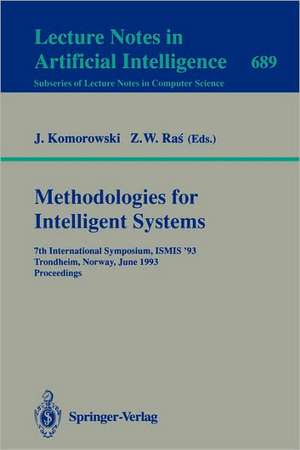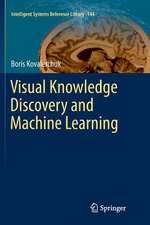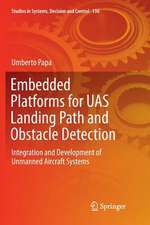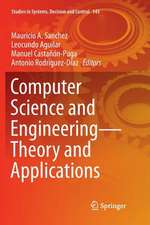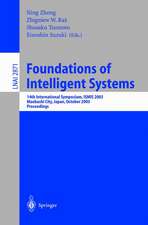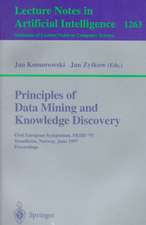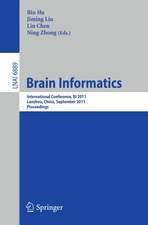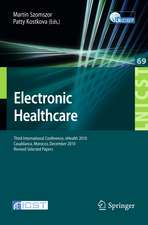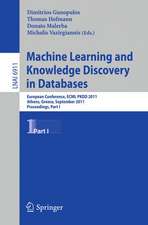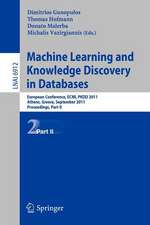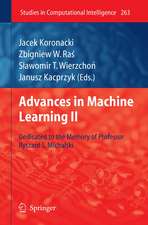Methodologies for Intelligent Systems: 7th International Symposium, ISMIS'93, Trondheim, Norway, June 15-18, 1993. Proceedings: Lecture Notes in Computer Science, cartea 689
Editat de Jan Komorowski, Zbigniew W. Rasen Limba Engleză Paperback – iun 1993
Din seria Lecture Notes in Computer Science
- 20%
 Preț: 1061.55 lei
Preț: 1061.55 lei - 20%
 Preț: 307.71 lei
Preț: 307.71 lei - 20%
 Preț: 438.69 lei
Preț: 438.69 lei - 20%
 Preț: 579.30 lei
Preț: 579.30 lei -
 Preț: 410.88 lei
Preț: 410.88 lei - 17%
 Preț: 427.22 lei
Preț: 427.22 lei - 20%
 Preț: 596.46 lei
Preț: 596.46 lei - 15%
 Preț: 448.04 lei
Preț: 448.04 lei - 20%
 Preț: 353.50 lei
Preț: 353.50 lei -
 Preț: 389.49 lei
Preț: 389.49 lei - 20%
 Preț: 309.90 lei
Preț: 309.90 lei - 20%
 Preț: 645.28 lei
Preț: 645.28 lei - 20%
 Preț: 763.23 lei
Preț: 763.23 lei - 15%
 Preț: 580.46 lei
Preț: 580.46 lei - 20%
 Preț: 310.28 lei
Preț: 310.28 lei - 20%
 Preț: 655.02 lei
Preț: 655.02 lei - 20%
 Preț: 1183.14 lei
Preț: 1183.14 lei - 20%
 Preț: 340.32 lei
Preț: 340.32 lei -
 Preț: 449.57 lei
Preț: 449.57 lei - 20%
 Preț: 591.51 lei
Preț: 591.51 lei - 18%
 Preț: 938.83 lei
Preț: 938.83 lei - 20%
 Preț: 337.00 lei
Preț: 337.00 lei - 20%
 Preț: 649.50 lei
Preț: 649.50 lei - 20%
 Preț: 607.40 lei
Preț: 607.40 lei - 20%
 Preț: 1414.79 lei
Preț: 1414.79 lei - 20%
 Preț: 1024.44 lei
Preț: 1024.44 lei - 20%
 Preț: 583.40 lei
Preț: 583.40 lei - 20%
 Preț: 453.32 lei
Preț: 453.32 lei - 20%
 Preț: 575.49 lei
Preț: 575.49 lei - 20%
 Preț: 1075.26 lei
Preț: 1075.26 lei - 20%
 Preț: 585.88 lei
Preț: 585.88 lei - 20%
 Preț: 825.93 lei
Preț: 825.93 lei - 17%
 Preț: 360.20 lei
Preț: 360.20 lei - 20%
 Preț: 763.23 lei
Preț: 763.23 lei - 20%
 Preț: 340.32 lei
Preț: 340.32 lei - 20%
 Preț: 504.58 lei
Preț: 504.58 lei - 20%
 Preț: 369.13 lei
Preț: 369.13 lei - 20%
 Preț: 580.93 lei
Preț: 580.93 lei - 20%
 Preț: 343.62 lei
Preț: 343.62 lei - 20%
 Preț: 350.21 lei
Preț: 350.21 lei - 20%
 Preț: 583.40 lei
Preț: 583.40 lei - 20%
 Preț: 583.40 lei
Preț: 583.40 lei - 15%
 Preț: 438.59 lei
Preț: 438.59 lei - 20%
 Preț: 341.95 lei
Preț: 341.95 lei - 20%
 Preț: 238.01 lei
Preț: 238.01 lei - 20%
 Preț: 538.30 lei
Preț: 538.30 lei
Preț: 351.04 lei
Preț vechi: 438.80 lei
-20% Nou
Puncte Express: 527
Preț estimativ în valută:
67.18€ • 69.88$ • 55.46£
67.18€ • 69.88$ • 55.46£
Carte tipărită la comandă
Livrare economică 12-26 aprilie
Preluare comenzi: 021 569.72.76
Specificații
ISBN-13: 9783540568049
ISBN-10: 3540568042
Pagini: 676
Ilustrații: XIV, 662 p.
Dimensiuni: 155 x 235 x 35 mm
Greutate: 0.93 kg
Ediția:1993
Editura: Springer Berlin, Heidelberg
Colecția Springer
Seriile Lecture Notes in Computer Science, Lecture Notes in Artificial Intelligence
Locul publicării:Berlin, Heidelberg, Germany
ISBN-10: 3540568042
Pagini: 676
Ilustrații: XIV, 662 p.
Dimensiuni: 155 x 235 x 35 mm
Greutate: 0.93 kg
Ediția:1993
Editura: Springer Berlin, Heidelberg
Colecția Springer
Seriile Lecture Notes in Computer Science, Lecture Notes in Artificial Intelligence
Locul publicării:Berlin, Heidelberg, Germany
Public țintă
ResearchCuprins
On extended disjunctive logic programs.- Model finding strategies in semantically guided instance-based theorem proving.- An expressive three-valued logic with two negations.- Compiling proof search in semantic tableaux.- Short CNF in finitely-valued logics.- Defining variants of default logic: A modal approach.- An admissible heuristic search algorithm.- Building an expert system language interpreter with the rule network technique.- Input-driven control of rule-based expert systems.- Case-based planning for medical diagnosis.- MethoDex: A methodology for Expert Systems development.- Towards intelligent databases.- Combining classification and nonmonotonic inheritance reasoning: A first step.- Mechanical proof systems for logic II, consensus programs and their processing.- The logic of only knowing as a unified framework for non-monotonic reasoning.- Terminological logic involving time and evolution: A preliminary report.- Knowledge management by example.- System reorganization and load balancing of parallel database rule processing.- Using semantic information for processing negation and disjunction in logic programs.- On the interpretation of set-oriented fuzzy quantified queries and their evaluation in a database management system.- Methodologies for knowledge-based software engineering.- Updating logic programs.- Expressing program requirements using refinement lattices.- Finding logical consequences using unskolemization.- Controlled explanation systems.- Signed formulas: A liftable meta-logic for multiple-valued logics.- New design concepts for the FLINS-Fuzzy Lingual System: Text-based and Fuzzy-Centered architectures.- Boolean reasoning for decision rules generation.- Upper and lower entropies of belief functions using compatible probability functions.- Reasoning about higher order uncertainty in possibilistic logic.- Approximation methods for knowledge representation systems.- Modelling of industrial systems.- On the satisfiability of symmetrical constrained satisfaction problems.- A logical reconstruction of constraint relaxation hierarchies in logic programming.- A performance evaluation of backtrack-bounded search methods for N-ary constraint networks.- Finite domain consistency techniques: Their combination and application in computer-aided process planning.- Should decision trees be learned from examples or from decision rules?.- Integrating machine-learning techniques in knowledge-based systems verification.- Automatic theorem generation in plane geometry.- Learning simple recursive theories.- The many faces of inductive logic programming.- CONSENSUS: A method for the development of distributed intelligent systems.- Script and frame: Mixed natural language understanding system with default theory.- Constructive matching methodology: Formally creative or Intelligent inductive theorem proving?.- Representing the knowledge used during the Requirement engineering activity with generic structures.- Development of a programming environment for intelligent robotics.- On the complexity of the instance checking problem in concept languages with existential quantification.- Mutual knowledge.- Expressive extensions to inheritance networks.- A connectionist-symbolic cognitive model.- Multi-Context systems as a tool to model temporal evolution.- Systematic assessment of temporal reasoning methods for use in autonomous agents.- GGD: Graph Grammar Developer for features in CAD/CAM.- A knowledge-Based approach to group analysis in automated manufacturing systems.- CENTER: A system architecture for matching design and manufacturing.- Knowledge-based system integration in a concurrent engineering environment.- A reflective strategic problem solving model.- On the learning of rule uncertainties and their integration into probabilistic knowledge bases.- Recognition of functional dependencies in data.- Rough set learning of preferential attitude in multi-criteria decision making.
